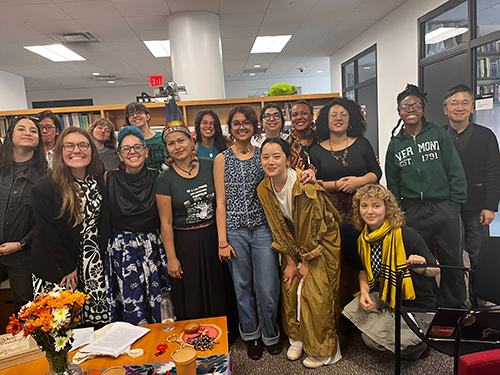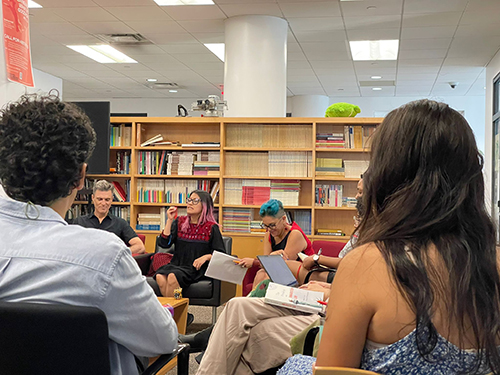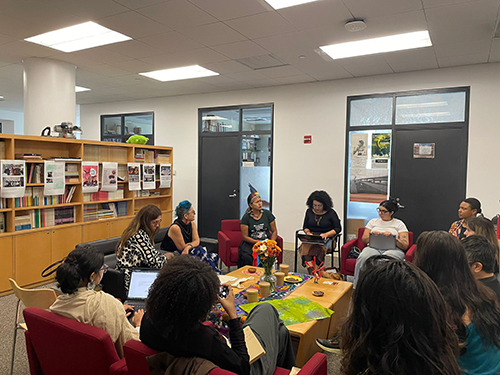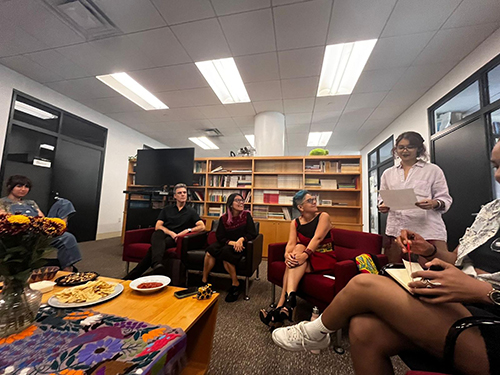As part of this year’s Climate Week NYC, the Anthropology Department at NSSR hosted two enlightening conversations rooted in the critical and intersecting themes of climate change, Indigenous perspectives, and temporality. The event was co-organized by Professor Columba González-Duarte and Safina Azeem Qureshi, currently an MA student in the Anthropology department, for the graduate seminar, Deep Futures: Feminist Ecological Imaginaries from Latin America/Abya-Yala. The events offered students and faculty a platform to engage in interdisciplinary discussions that challenge the dominant narratives around climate justice.
The first conversation, held on September 19th, welcomed a diverse panel of speakers including Ashley Dawson, founder of the Climate Action Lab at CUNY; Columba González-Duarte herself, a leading scholar in feminist ecological imaginaries; and Lucía Ixchíu, a Mayan Indigenous K’iche cultural promoter, journalist, and land defender in the exile.
The theme of the event was to explore how climate change is experienced not only as an environmental crisis but as a crisis of time—particularly for Indigenous communities whose cosmologies and temporalities differ significantly from the Western scientific framework. Lucía Ixchíu brought to the fore the urgent need to recognize Indigenous perspectives on time, community living, and climate resistance. In a world that often marginalizes Indigenous knowledge systems, this conversation highlighted the importance of alternative temporalities in framing solutions to ecological disasters. Ixchíu’s emphasis on seeing time as mixing future-past-present, rather than linear, allowed for a deeper understanding of how long-term resilience co-developed with other species can be built into the fight against environmental degradation.
Ashley Dawson, whose work at the Climate Action Lab has paved the way for innovative climate solutions around public power and decolonizing conservation within academia and beyond, spoke to the intersection of activism and scholarship. His emphasis on action-based research, grounded in both local communities and larger networks of change, served as a timely reminder that the academy is not separate from the pressing global issues we face, but rather deeply embedded in them.
On September 26th, the department hosted a second conversation, furthering these discussions of climate justice by welcoming two prominent speakers: Marisol Garcia, a leader of the Kichwa people from Peru, and Professor Deborah Delgado Pugley from Pontificia Universidad Católica del Perú and a Visiting Professor at Brown. Marisol Garcia’s presence, made possible by a crowdfunding effort, brought a grassroots perspective to the conversation, focusing on the advocacy for Indigenous territorial sovereignty. Her insights into the practical challenges her community faces—ranging from patriarchy, resource extraction to deforestation and fires—reaffirmed the inextricable link between land, identity, and women’s ecological and situated work. Professor Delgado Pugley, who has long worked at the nexus of sociology, environment, and Indigenous rights, added academic depth to the conversation. Her reflections on how Peru’s Indigenous communities navigate global climate policies showed how local, national, and international spheres are interwoven in complex ways.
Both of these events drew attention to how climate resistance cannot be thought of without acknowledging Indigenous communities’ struggles and contributions. Through these dialogues, students were invited to not only reflect but also engage with the materials and stories shared by the speakers, and a sense of responsibility towards fostering more inclusive climate justice efforts to reimagine Deep Futures.
For more information, you can contact Columba González-Duarte.




